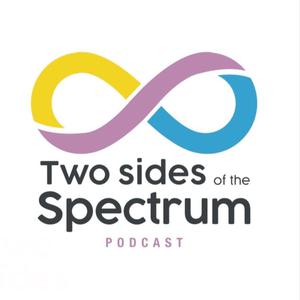
Two Sides of the Spectrum
Meg Proctor
A place where we explore research, amplify autistic voices, and change the way we think about autism in life and in professional therapy practice. Visit learnplaythrive.com/podcast/
- 1 minute 28 secondsUpdates from Learn Play Thrive
We miss you! Get the updates on what's happening at Learn Play Thrive. And download our free packet of parent handouts at learnplaythrive.com
View show notes and transcript at learnplaythrive.com/podcast
8 January 2025, 5:05 pm - 52 minutes 7 secondsUnmasking Autism in Action with Dr. Devon Price
This episode dives deep into some of the more foundational questions around being Autistic and neurodiversity, tying this into the larger systems we are embedded in. Our guest, Dr. Devon Price, helps us explore the concepts of masking and authenticity and how we, as professionals supporting Autistic people, can push back against these pressures. Dr. Devon Price is a social psychologist, professor, author, and proudly Autistic person. He has written 'Unmasking Autism' and 'Laziness Doesn't Exist'.
View show notes and transcript at learnplaythrive.com/podcast
7 August 2024, 10:00 am - 49 minutes 20 secondsPart-Time AAC Use with Dr. Alyssa Hillary Zisk
In this episode, we talk about why and how part-time AAC use can support authentic participation for many autistic people. We also explore Dr. Alyssa Hillary Zisk’s insights on teaching AAC from their perspective as an engineer, as a researcher, and as an AAC user.
Dr. Alyssa Hillary Zisk is an Autistic part-time AAC user, using a variety of text-based tools. They are the AAC research team lead at AssistiveWare. Their doctoral dissertation was on brain computer interfaces for people with ALS.
View show notes and transcript at learnplaythrive.com/podcast
17 July 2024, 10:00 am - 22 minutes 47 secondsNigh Functioning Autism: From Shame to Empowerment with Tiffany Joseph
In this episode with autistic AAC user Tiffany Joseph (they/them, she/her), we cover functioning labels, AAC access, how race intersects with disability in the Autistic community, aggressive behaviors, and so much more. But the thread that runs throughout the conversation is empowering our clients to participate more authentically in their daily life. Tiffany Joseph, or TJ, is an Autistic educational consultant, and runs the Instagram and Facebook pages 'Nigh Functioning Autism', where they post about AAC, being Black and Autistic, epilepsy, ADHD, OCD, and more.
View show notes and transcript at learnplaythrive.com/podcast
3 July 2024, 10:00 am - 47 minutes 11 secondsStrengths-Based Approaches: How to Deeply Center Passions with Dr. Kristie Patten
In this episode (a repeat of one of our earliest episodes, episode 4), Dr. Kristie Patten takes us to the foundations of what it means to be strengths-based and the impact that it has on the lives of our Autistic clients. Dr. Kristie Patten is Counselor to the President and professor of occupational therapy at NYU and the Principal Investigator of NYU Steinhardt's NEST Project, supporting New York City Public Schools’ largest inclusion program in the United States for Autistic students. In this episode Dr. Patten shares why it's really easy to be a bad therapist and really hard to be a good one (plus some concrete steps to take to help get us there!)
View show notes and transcript at learnplaythrive.com/podcast
19 June 2024, 10:00 am - 34 minutes 17 secondsAutism & Interoception with Kelly Mahler
In this episode (a repeat of episode 44) we dive into interoception, our ability to understand the messages we are getting from inside our bodies. Our guest, Kelly Mahler, makes the connection between interoception and truly neurodiversity-affirming therapy practices. Kelly Mahler presents internationally on interoception and has authored 12 resources, including The Interoception Curriculum. This episode covers how a deeper understanding interoception can help us support authentic self-regulation for our autistic clients. It’s a must-listen for any professional who supports Autistic clients.
View show notes and transcript at learnplaythrive.com/podcast
5 June 2024, 10:00 am - 40 minutes 59 secondsCultivating Freedom and Authenticity in Daily Life Through Culturally-Affirming Practices with Heather Clarke
How can we center the needs of our Black Autistic clients? And how can we create spaces that allow for joyful, authentic participation for all kids? Heather Clarke has a deep analysis of the barriers that exist - especially for Black Autistic youth - and a vision for how we can move towards making our spaces safer, more inclusive, and more joyful.
View show notes and transcript at learnplaythrive.com/podcast
15 May 2024, 10:00 am - 35 minutes 36 secondsStrengths-Based Goal Writing in Action with Rachel Dorsey
Many of us have never seen strengths-based, neurodiversity affirming goal writing in practice. In this episode, Autistic SLP Rachel Dorsey walks us through the ins and outs of how to write truly affirming goals for our Autistic clients that contribute to their well-being, not to burnout. Check out the newest version of Rachel’s CE course, Goal Writing for Autistic Students, (co-taught with an incredible team of OTs and SLPs) at learnplaythrive.com/goals.
View show notes and transcript at learnplaythrive.com/podcast
1 May 2024, 10:00 am - 26 minutes 43 secondsThe Power of Presuming Competence with Ido Kedar
Ido Kedar is a non-speaking AAC user who chronicles his experience in therapies both before and after he learned to type to communicate. In this re-airing of episode 9, Ido shares concrete advice on how therapists can be more respectful and effective when supporting non-speaking Autistic clients. Ido Kedar is an autistic-self advocate and the author of two books.
View show notes and transcript at learnplaythrive.com/podcast
17 April 2024, 10:00 am - 1 hour 8 minutesReclaiming our Wholeness with Honey Schneider
What is “neurosupremacy” and “neuronormativity,” and how does this differ from the idea of “neruotypicality”? What does peer counseling offer that traditional therapy misses? How can creativity help us break seemingly firm limits set by the systems of power and oppression that exist around us? In this episode, Honey Schneider helps us see the path to reclaiming our own wholeness, and to helping our clients do the same. Honey Schneider has an MA in Mental Health Counseling from NYU. They're white, disabled, and transsexual. Honey currently works as a peer coach.
View show notes and transcript at learnplaythrive.com/podcast
3 April 2024, 10:00 am - 51 minutes 56 secondsThe Cultural Model of Disability and Empowering Practice Frameworks with Bryden Carlson-Giving
Our practice frameworks are supposed to guide our work…but what happens when their authors of our practice framework haven’t analyzed their biases? In this episode, we discuss how ableism is built into the practice framework of occupational therapists, and what it looks like to do something totally different. Today’s guest, Dr. Bryden Carlson-Giving, wrote the first neurodiversity-affirming practice framework for OTs – and there’s something to learn from it no matter what field you work in. We also dive into the cultural model of disability, the limitations of evidence-based practice, and so much more. Dr. Bryden Carlson-Giving is a queer, neurodivergent, and disabled occupational therapy practitioner who developed The EMPOWER Model.
View show notes and transcript at learnplaythrive.com/podcast
20 March 2024, 10:00 am - More Episodes? Get the App
Your feedback is valuable to us. Should you encounter any bugs, glitches, lack of functionality or other problems, please email us on [email protected] or join Moon.FM Telegram Group where you can talk directly to the dev team who are happy to answer any queries.
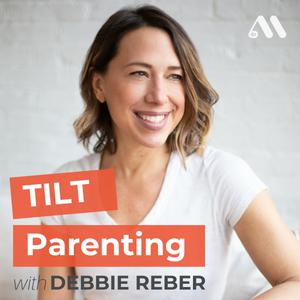 TILT Parenting: Raising Differently Wired Kids
TILT Parenting: Raising Differently Wired Kids
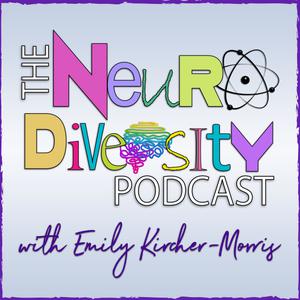 Neurodiversity Podcast
Neurodiversity Podcast
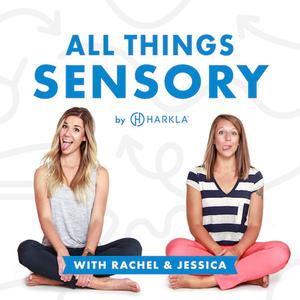 All Things Sensory by Harkla
All Things Sensory by Harkla
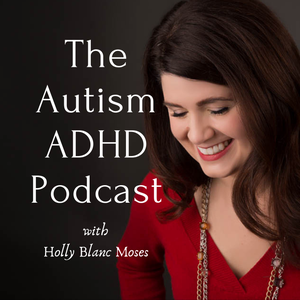 THE AUTISM ADHD PODCAST
THE AUTISM ADHD PODCAST
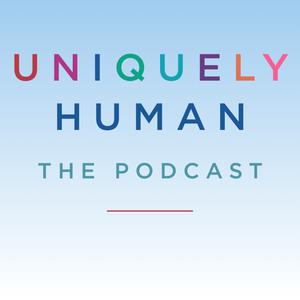 Uniquely Human: The Podcast
Uniquely Human: The Podcast
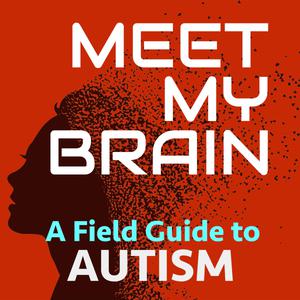 Meet My Autistic Brain
Meet My Autistic Brain